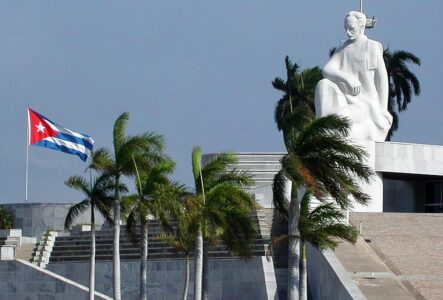Written by Rosa Miriam Elizalde. Originally published by Resumen
What you see from the window of my apartment in Havana does not resemble the images that war conflicts usually leave behind. Here there are no missiles being fired, no camouflaged soldiers, no weapons. Nor do armored tanks pass by. The war does not manifest itself in body counts and car bombs, but in the shock of everyday life: the line for gasoline now stretches for several kilometers and the grocery store on the corner is closed because there is no oil to bring in food. There are people who have been waiting for hours for a bit of bread, the one they are given by the booklet that regulates the regulated products. Medicines are scarce. The elevator in my building is still broken and the mechanic who fixes it does not arrive because public transportation is hellish. Blackouts come and go.
As always, the sun scorches the sidewalks at noon and the streets are full of people busy with their lives. An ice cream sandwich vendor peddles by. Children frolic in the park and others play ball in the ruins of an old warehouse. The sea, on the horizon line. It doesn’t look like a war zone, even though war is the normal state of this country; a silent war, which has been for too long our background and habitat, and from which no one is spared.
A week ago, in the first session of the new legislature of the National Assembly of People’s Power (Parliament) that re-elected him as president, Miguel Díaz-Canel blamed the worsening of the blockade, the world crisis and our inabilities for the complicated situation Cuba is now experiencing. However, I keep thinking, with the city at my feet, that the worst thing about the daily shock is habit. We do not even notice the cumulative effects of more than 60 years of economic policies designed to asphyxiate us and sell us the U.S.-assisted transition as a remedy.
Cubans live at a disadvantage -there is no other way-, but the other side of the coin is worse. Jacob Hornberger, a businessman and politician who often runs unsuccessfully as an independent candidate for the U.S. presidency, believes that Washington’s prolonged cruelty against other countries has caused irreparable damage to the American people.
The conscience of Americans has been brutalized….. Many can easily recognize, confront and oppose evil that supposedly derives from foreign regimes, but find it very difficult, if not impossible, to identify, confront and oppose evil within their own country, Hornberger asserts in his book An Encounter with Evil: The Abraham Zapruder Story, published less than a year ago. He tackles the biography of the man who filmed the assassination of John F. Kennedy on November 22, 1963, and at one point dwells on the long abnormality of the blockade initiated by this Democratic president.
In an environment of normalized cruelty, the author argues, it is almost impossible that a resistance movement like that of the White Rose, the group of Christian college students in Nazi Germany who rebelled against their own government at the height of fascism’s crimes during World War II, could occur in the United States.
The silence of more than six decades against the evil of the U.S. embargo is a perfect example of this phenomenon. We all condemn terrorism because it is based on attacking innocent people as a way to achieve a political goal. Yet that is precisely what the embargo against Cuba does. Why is it that so many Americans can see the evil in terrorism, but not the evil in the embargo, asks Hornberger.
Perhaps the answer is not so difficult. The embargo follows very strict rules, which respond to a high degree of social organization and include silencing crime, when it fails to justify it. State terrorism has an articulated knowledge, methodically prepares its tasks, and defines the strategic feature of its objectives, as those who lived through Nazism or suffered the Latin American dictatorships know very well. The victims, those who come and go in a city under an endless war, never plan anything, except to live and survive.
And what is left, after all, is pure common sense: to defeat the blockade without waiting for it to be lifted, as Díaz-Canel said in Parliament.





If the globalist cartels are not eliminated, the vast majority whole of the worlds population will suffer the fate of Cuba.
Cuba is frozen in time, consider yourself fortunate. Modernity and materialism is not what it is cracked up to be.
Nor are sanctions
Well, the sanctions are meaning nothing these days. The Russians ans Chinese don’t observe them. Venezuela doesn’t. Mexico and it’s people are disgusted with the US government and its policies. States will start to trade with eachother with their own currency. More states ditch the dollar. Many states are pulling their cash from US dominated markets. US hegemony is near its end, and already is receding.
The economic blockade of Cuba is absolutely a crime against humanity and someone is going to pay for it. On this planet or the next stop.
Of course the embargo is a very bad thing to happen but something needs to change in Cuba and the communists should go.
Brussels is where sanctions and invasions of foreign lands comes from. The US was invaded by the same group that killed the locals with diseases in South Africa (1650), North America and Australia. I wonder why they blame the US for all the troubles in the world when the US owes them $30T in just the 120 years since the FED was created in 1913.